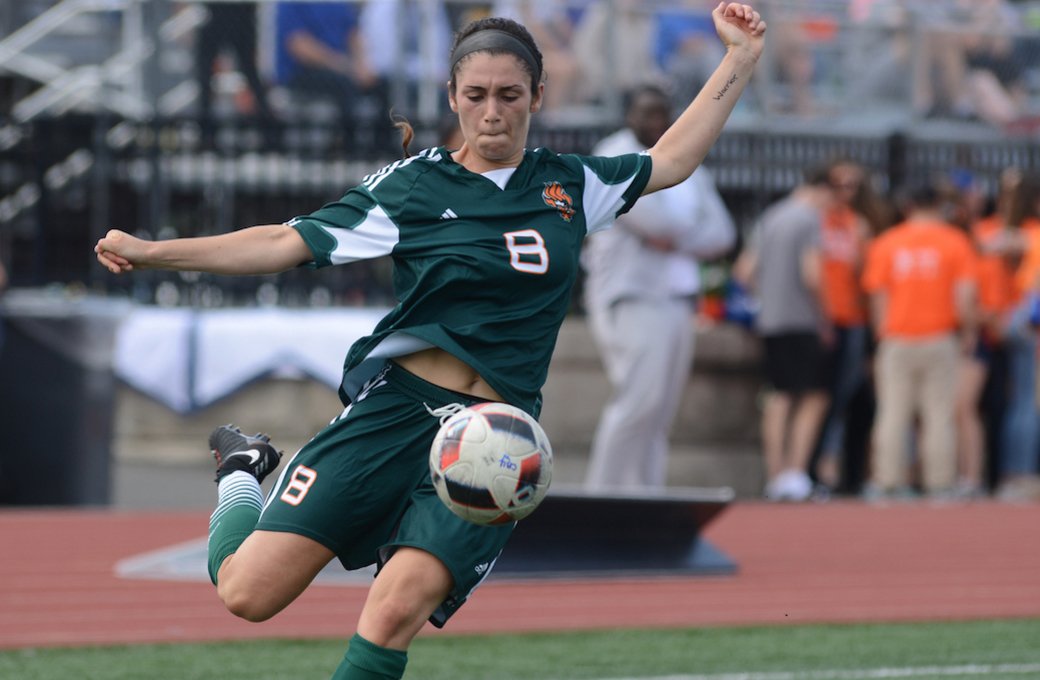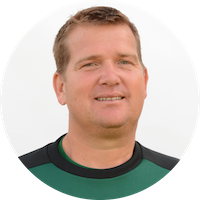Women’s Soccer
Getting to know your U SPORTS student-athletes: Ciera Disipio, Cape Breton Capers


U SPORTS Staff
Throughout the 2017-18 season, U SPORTS sits down with one key athlete, coach, and staff member of each U SPORTS athletic program in our new interview series “Getting to know…”

Name: Rob Giesbrecht
School: University of the Fraser Valley
Sport: Women’s soccer
Position: Head coach
Seniority: Eight seasons
Previous school/position: Head coach, women’s soccer at Concordia University (Nebraska)
Hometown: Abbotsford, B.C.
1. How did you first get involved in coaching? What was your path to your position as head coach of the Cascades?
I got involved in coaching after my university playing career was over. I had an extra year of studies to do, my eligibility was up, so I stuck around and served as an assistant coach at Trinity Western in 1996-97.
My path to where I am now? I spent six years as the assistant coach with the women’s soccer program at Trinity Western, and then in 2005, I moved down to Nebraska to start my first head coaching job at Concordia University, in a little town called Seward. We were there for five years. Then the UFV job opened up in my hometown of Abbotsford in 2010, and I applied for it, got it, and moved home.”
2. Who are the people that have influenced you most as a coach?
I have two mentors. One is Alan Alderson, who I played for way back in the day at Trinity Western. And luckily for me it’s worked out that he’s served as my assistant coach here at UFV on two separate occasions. My other mentor is Graham Roxburgh at Trinity Western (the Spartans current women’s soccer head coach). I served as Graham’s assistant for six years, and as I transitioned to becoming a head coach, Graham was very helpful to me, letting me bounce ideas off him. Even though we are opposing coaches now we have maintained our friendship. Our friendship just takes 90-minute breaks a couple times a year.
3. How would you describe your coaching style?
As a coach, I strive to inform and prepare the athletes, and I try to do that through establishing relationships built on trust and open communication. I’m a passionate coach – I want to do well, I want my teams to do well, and I try to instill that passion into my teams.
4. Which coach do you admire the most, and why?
I’m a Liverpool supporter, so I’m going to go with Jurgen Klopp. I love the assertive style that Jurgen’s teams always play with. He’s very passionate on the sideline. Victories, for him, always seem to mean so much, and defeats seem to hurt so much. I think as a coach, I’m similar to that. I really pour myself into it, and I want my teams playing on their physical, mental and emotional edge as Jurgen Klopp’s teams do.
5. What is the most “out-of-the-box” thing you’ve done as a coach?
On a couple different occasions, we’ve surprised our teams with bowling tournaments. When the team is expecting a grueling, fitness-based practice, we’ll surprise them with a real fun bowling night, building our team culture and letting the girls have some fun together. The first time we did that was definitely out of the box. But we saw it work, so it kind of became a norm for us – to pick a time where we think it’s the right thing to do. You build that social capital with your team that really pays off. When the girls really like to be together, they like to compete together.
6. What is your greatest coaching moment or achievement?
As an assistant coach, definitely the 2004 run to the national championship with Trinity Western. That was awesome.
As a head coach, it would be the two times we went to U SPORTS nationals here at UFV. The first time (in 2010), we were a complete underdog. We went out to the Canada West Final Four and beat Trinity in a semifinal on penalties, then beat UBC in the final. Then we went off to UPEI (for U SPORTS nationals) and got third. In 2014, in the Canada West semifinal against Alberta, we won 1-0. When Shelby Beck scored that goal late to put us into the national tournament, it was a lot of fun with a special group of players. You saw a bit of the passion there.
7. What’s the best advice you can give to an athlete and/or athlete’s parents?
The best advice I can give them is to cherish this time. It’s such a special time in a young person’s life. I’m in my mid-40s now, and when I get together with my university teammates from years ago, it’s such a special time. Those friendships last a lifetime, and often, the moments outside the competitive environment are the ones that you still talk about many years later. The games are special, the championships are awesome, but it’s the relationships you build. So invest in your team. Get to know your teammates. It’ll help you in the short term – you’ll die on the park for those teammates that you are close to and you’ve built relationships with. And you’ll also have lifelong friends.
8. How have you changed as a coach over time? What principles/values, etc. have remained the same?
As I’ve matured as a coach, I’ve tried to focus my energy and passion into more useful areas. I used to get distracted with officials and those types of things – things that were out of my control. As I’ve matured, I’ve been able to focus more on things that I can control and not work myself up about things that are beyond my control, and learn to appreciate the work of the officials.
Things that have remained the same? Still investing everything into what you’re doing. And how we treat the student-athlete – they’re a person first, a student second, and an athlete third. I’ve got to keep things in perspective, and help them. Another thing is, as I’ve matured, I’ve kept my passion for the game. That’s not left me.
9. What do you enjoy doing when you’re not in coaching mode?
I like spending time with my family, watching my kids play different sports. My daughter Sidney is 13 – I have the chance to coach her in soccer, and she likes to play basketball as well. Our twin boys are Jacob and Josiah – they just turned 12. They love to play hockey, as does our young guy Will, who’s 10. I love to watch them play hockey, or on their school teams. As a coach you’ve got a busy calendar, so the times that you don’t have obligations to go traveling or recruiting or whatever, it’s nice to spend some time with the family.
10. What’s the most embarrassing thing that’s ever happened to you as a coach?
My first year at UFV, I rushed to the field and I wore my coaching shirt inside out for the entire practice. I was still relatively new with the girls, and it wasn’t until about 10 minutes left in the practice that they told me. Then the next year, the girls organized inside-out day, where everybody wore their training gear inside out.
Women’s Soccer
U SPORTS Staff
